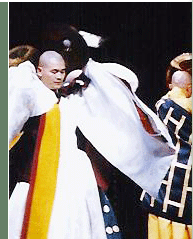|
Pompae is a singular sound rhythm with the indifference in length
and harmony. It can be divided into Anchaebi, Bakkatchaebi, and
Hwacheong. Anchaebi forms a genuine buddhist ceremony, and consists
of Yuchiseong[chant hymn of reasoning, prior to the earnest request
of the respectable teachers's appearance], Chak-uiseong[chant hymn
of comment on the description of Buddha's words and His behavior],
Pyeon-gaeseong[chant hymn of praise to the virtue and doctrine of
Buddha], Gaetagseong[chant hymn of commence of wooden gong]. There
are Hotsori[narrations with forms of 7 syllables 4 phrases or 5
syllables 4 phrases sung by solo or chorus in medium length tones]
and Jitsori[lyrics written in prose or in Sanskrit and sung by chorus
with long length tones] in Bakkatchaebi. In general Pompae indicates
Hotsori. Beom-eum is another name of Jitsori. And Hwacheong is sung
with the genuine Han-geul[Korean characters]. Formalities of common
buddhist ceremonies are divided into Sangjukwon-gongjae[name of
memorial service], Siwanggakbaejae[name of memorial service], Saengjeonyesujae
[name of memorial service], and Yeongsanjae[name of memorial service]
according to the size of services for the deceased. The sound of
Anchaebi is used at the simple services and Sisik [to set up offerings
in front of Buddha and to recite a Sutra for the deceased parents
or the poor souls], and at the rest of services like Yeongsanjae
all of Anchaebi, Bakkatchaebi and Hwacheong are used.
 The
sound of Bakkatchaebi The
sound of Bakkatchaebi
Bakkatchaebi is consisted of Hotsori and Jitsori, and is normally
sung by monks who learned songs like Sangjukwon-gong, Gakbae and
Yeongsan professionally. The narrations in Hotsori are constructed
into 7 syllables 4 phrases or 5 syllables 4 phrases, and normally
written in forms of prose with Chinese writings or Jin-eon[dharani]
in Sanskrit. Jitsori has forms of simple lyrics and its playing
time lasts for 30 minutes to one hour in general. Thus, it is sung
by the professionally trained monks, so called Eojang. Eojang must
be capable of not only singing all tunes freely but also understanding
overall procedures of ceremony and its theory. Thus, Eojang means
the masters who finished the courses of Malgang, Junggang, and Sanggang
in order. There were 72 songs of Jitsori. However, only 15 songs
presently remain.
 |
|
Hotsori
|
Jitsori
|
Hotsori as an accompaniment for
Jakbeopmu
[buddhist dance]
|
| Halhyanggeseong |
Insung |
Doryangge |
| Gaegeseong |
Georyeongsan |
Dage |
| Gayoungseoung |
Gwanyokge |
Unsimge |
| Songjaseong |
Mok-yogjin-eon |
Hyanghwage |
| Soseong |
Danjeongrye |
Moranchan |
| Changheunseong |
Borye |
Ogongyang |
| Won-ageseong |
Sikyeongsan |
Samggwiui |
| Changbulseong |
Dugeop |
Changheun |
| Samryesabuchungseong |
Okwan-ge |
Jiokge |
| Yog-geon-iseong |
Yeongsanjisim |
Samnamtae |
| Hyangsunayeolseong |
Teuksagaji |
Guwongeopjung |
| Gajigeseong |
Geobul |
Jeongrye |
| Bogongyang Bohoehyangseong |
Samnamtae |
Jagwibul |
| Heonjwageseong |
Sammaha |
Daegakseokseokgajon |
| Bokcheongge |
Om-ahom |
Sabangyosin, guikyeongjakbeop |
| Deungge |
Other Banjitsori
(Onghoge,Changbul) |
Mandaljakbeop |
| Hapjwage |
|
|
|
|
|
 The sound of Anchaebi
The sound of Anchaebi
The lyrics of Anchaebi are mainly proses written in Chinese writing.
Contrary to Bakkatchaebi, it forms with the compact series of short
sounds. Usually Byeongbeop [master monk of ceremony] or Beopju[preacher
monk] play its 4, 6 syllables formatted contents in solo such as
Chak-eoseong with or without shaking of a bell.
 |
|
Yuchiseoung
|
Chak-eoseong
|
Pyeon-geseong
|
Getakseong |
Soseong |
| Jebultongchung |
Gwan-eumsisik |
Gwan-yok and sisik
(Pyeon-geseong) |
Yeongsangaege |
Geonhoeso |
| Mitacheong |
Jeonsisik |
|
Wonbugaege |
Gaegeso |
| Yaksacheong |
Gubyeongsisik |
|
Sangbugaege
|
Daehoeso |
| Mireukcheong |
Hwaeomsisik |
|
|
Samboso |
| Gwan-eumcheong |
|
|
|
Sandanso |
| Jijangcheong |
|
|
|
Siwangso |
| Nahancheong |
|
|
|
Sajaso |
| Chilseongcheong |
|
|
|
Haengcheongso |
| Sinjungcheong |
|
|
|
Cheongjangso |
| Sansincheong |
|
|
|
Muljangso |
| Kwiwangcheong |
|
|
|
Seongwiso |
| Dokseongcheong |
|
|
|
Myeongwiso |
| Hyeonwangcheong |
|
|
|
Hamhapso |
| Jeseokcheong |
|
|
|
Oroso |
| Sacheonwangcheong |
|
|
|
Jungwiso |
| Pungbaek-usacheong |
|
|
|
Hawiso |
| Garamcheong |
|
|
|
Hoehyangso |
| Yongwangcheong |
|
|
|
Pungbaek-usaso |
| Jeongsincheong |
|
|
|
Daeryeongso |
| Taesecheong |
|
|
|
|
|
|
|
 The sound of Hwacheong
The sound of Hwacheong
Hwacheong consists of Sandan Chukwon[Blessing] Hwacheong and Jungdan
Jijang Chukwon[Blessing] Hwacheong. It is differentiated from Anchaebi
and Bakkatchaebi in style. Its melody is easy for general public
to understand. For example, Hoesimgok[a song which advises a kind-hearted
life] which has the form of two parts, one the life story and another
the post-life (after death) story. It is sung by each Pompae monk
of unique voice in Korean language.
 |
|
① Melody
|
② Sangdan Chukwon
[Blessing]
|
③ Jijang Blessing Hwacheong
|
Chamseon-gok, Hoesimgok,
Simmyeon-ga, Chanbulga, Wangsaengga
Monghwan-ga, Kyeongchukga, Seongtan-ga, Seongdoga,
Mokryeon-ga
Odoga, Gwonwangga, Yeolban-ga, Wonjeokga, Wol-inga
Gwonmyeon-ga, agagaeum,
Byeolhoesimgok
|
|
Palsanghwacheong
Yukgap-hwacheong
Gosaseon-yeombul
Bumoeunjungkyeongcheong
|
|
|
|
|




